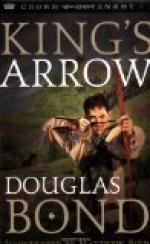His wife, a gentle and refined woman, never agreed with him in his disloyalty to the King. At first she pleaded and reasoned, but at last gave up in despair, and devoted herself to her simple household affairs, and the training of her one child, the only comfort of her solitary life. When at length she left him and he laid her body to rest at the foot of a big pine tree, he was a heart-broken man. He understood when it was too late what she had meant to him. Then when Dane, influenced by his mother’s teaching, left him to become one of the King’s rangers, his cup of sorrow was filled to overflowing. For months after he lived a lonely life within his silent house, dreaded by the slashers and Indians alike. The latter shunned his solitary abode, and always spoke of him on rare occasions as the chief with the “twisted head.”
When, however, the English forces were defeated, and the war brought to a close, Norman’s hopes again revived. He became active once more, feeling certain that the Indians and others would now side with the conquerors and wrest England’s grip from the valley of the St. John River. The King’s mast-cutters had been a source of continual worry to him. Why should those great pines be used for the royal navy? he asked. They belonged to the natives and other occupants of the land, and should be reserved for future needs. The marking of the choicest trees with the broad arrow filled his heart with bitterness, and his words so aroused the rebel brood around him that they decided to drive the mast-cutters out of the country, and put a stop to the business. The arrival of thousands of Loyalists also stirred him deeply, and he spread the report, which was readily taken up, that the newcomers would settle on all the good land, slaughter the game, and force the rightful owners to leave.
The failure of the attempt upon the Loyalists during the fall, and the carrying of Flazeet and Rauchad to Fort Howe had only embittered the rebels who had not taken part in the affair. They roused to action, and determined to wreak revenge upon the mast-cutters between the St. John and the A-jem-sek. They had arranged their plans with much secrecy, but they learned at the last minute that in some mysterious manner word had reached the rangers, who were hastening to the assistance of the King’s men. There was, accordingly, no time to lose. They must strike at once, and then vanish into the depths of the forest.
Thomas Norman was well aware of this proposed attack upon the mast-cutters. Although he did not oppose it, he took little interest in the matter. In fact, he had very little ambition for anything. He was feeling somewhat weary during the fall, and the silence of his house was more depressing than ever. During the lonely days, and still more lonely nights, he thought much about the past. He knew that he had made a failure of life, and that he had nothing to live for now. At times he would endeavor to fan the coals of rebellion by reading “King Lear,” “Timon of Athens,” and the story of Old Aeneas. But the effect was never lasting, and when the artificial stimulation subsided he was more depressed than ever.




